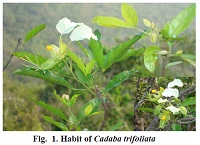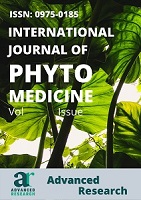Phytochemical constituents of Cadaba Trifoliata Roxb. root extract
Keywords:
Cadaba trifoliata, phytochemical constituents, alcoholic root extractsAbstract
Cadaba trifoliata Roxb is belongs to the family Capparaceae, important medicinal plant of Indian medicinal plants. The methanol, ethanol, ethyl acetate and aqueous extracts along with dry powder of root were screened for the presence of phytochemicals. The phytochemical constituents were analyzed by qualitative and GC-MS method. Preliminary studies showed that the presence of Tannins, Steroids, Alkaloids, Glycosides, Flavonoids and Phenolic compounds. In the GC-MS analysis, 17 bioactive phytochemical compounds were identified in the alcoholic extract. The identification of phytochemical compounds in very high peak area, 1, 2-Benzenedicarboxylic acid, diisooctyl ester (C24H38O4) with RT 24.95 has peak area 51.86% and 1-Methyl-pyrrolidine-2-carboxylic acid (C6H11NO2) with RT 6.89 has peak area 20.58%. The main important compound phytol (C20H40O) with RT 18.95 ranks with peak area 1.21%. A nature compound contains diterpene activity anti-cancer, anti-diabetic, anti-inflammatory, anti-oxidant activity and antimicrobial activity.
References
Castello MC, Phattak A, Chandra N,
Sharon M. Antimicrobial activity of
crude extracts from plant parts and
corresponding calli of Bixa orellana L.
Indian journal of experimental biology.
; 40(12) :1378-1381.
Ertuk O, Kati H, Yayli N, Demirbag Z.
Antimicrobial properties of Silene
mutifida (Adams) Rohrb. Plant extract.
Turk J. Biol. 2006;30(1):17-21.
Mohnnta TK, Patra JK, Rath SK, Pal
DK, Thatoi HN. Evaluation of
antimicrobial activity and
phytochemical screening of oils and nuts
of Semicarpus anacardium L.f. Sci.res.
Essay. 2007;2 (11): 486-490.
Kumar AR, Subburathinam KM,
Prabaker G. Phytochemical screening of
selected medicinal plants of
asclepiadaceae family. Asian J.
Microbial. Biotechnol. Environ. Sci.
; 9 (1): 177-180.
Matthew KM. The Flora of Tamil Nadu
Carnatic, Tiruchirappalli. The Rapinat
Herbarium, St. Joseph's College,
Tiruchirappalli. 1981;36-38.
Yoganarasimhan SN. Medicinal Plants
of India. Vol.1, Bangalore: Interline
Publishing Pvt. Ltd. 1996; 8.
Chopra RN, Nayar SL, Chopra IC.
Glossary of Indian Medicinal Plants
(Raw Materials), New Delhi: CSIR
Publications. 1979; pp. 43-44.
Mariadoss M, John De Britto A. Origin
of Plant Derived Medicines.
Ethanobotanical Leaflets. 2008;12:373-
Uddin A, Anwar B, Ur Rahman A.
Identification and 13C NMR spectrum of
Stachydreine from Cadaba fruticosa.
Phytochem. 1975;14:292-293.
Yousif G, Iskarider KM, Eisa EB.
Alkaloids of Cadaba farinose and
Cadaba rotundifolia. Fitotera. 1984;55:
-118.
Sofowara AE. Medicinal plants and
traditional medicine in africa .2nd edn.
Spectrum books Ltd., Ibadan, Nigeria,
; 289.
Trease GE, Evans WC. Pharmacognsy.
th edn. Braillar tridel.can. macmillan
publishers. Viqar
Harborne JB. Phytochemical Methods:
Guide to Modern Techniques of Plant
Analysis. Chapman and Hall, London.
;3-8.
Edeoga HO, Okwa DE, Mbaebie BO.
Phytochemical constituents of some
Nigerian medicinal plants. Afr. J.
biotechnol. 2005;4(7)685-688.
Adams R. Identification of essential oil
components by Gas Chromatography
Mass Spectroscopy. 1995; Allured
Publishing Co., Carol Strea, IL.
Delazar A, Nazifi E, Movefeghi A,
Nahar L, Nazemiyeh H, Moghadem SB,
Asnaashari S, Sarkar SD. GC-MS
analysis of ornithogalum procerum.
Daru. 2009; 17: 33-36.
Arunkumar B, Muthuselvam M.
Analysis of phytochemical constituents
and Antimicrobial activities of Aloe vera
L. World Journal of Agricultural
Sciences. 2009; 5: 572-576.
Arokiyaraj S, Radha R, Martin S.
Perinbam K. Phytochemical analysis
and anti-diabetic activity of Cadaba
fruticosa. Indian Journal of Science and
Technology. 2008. 1(6):13-17



